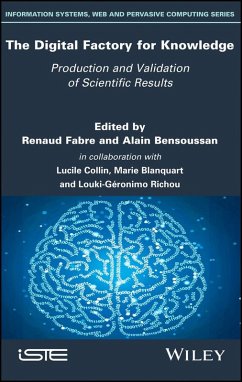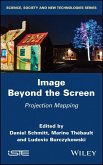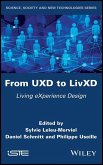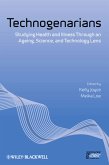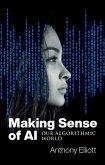The Digital Factory for Knowledge (eBook, ePUB)
Production and Validation of Scientific Results
Redaktion: Fabre, Renaud; Richou, Louki-Geronimo; Blanquart, Marie; Colin, Lucille; Bensoussan, Alain


Alle Infos zum eBook verschenken

The Digital Factory for Knowledge (eBook, ePUB)
Production and Validation of Scientific Results
Redaktion: Fabre, Renaud; Richou, Louki-Geronimo; Blanquart, Marie; Colin, Lucille; Bensoussan, Alain
- Format: ePub
- Merkliste
- Auf die Merkliste
- Bewerten Bewerten
- Teilen
- Produkt teilen
- Produkterinnerung
- Produkterinnerung

Hier können Sie sich einloggen

Bitte loggen Sie sich zunächst in Ihr Kundenkonto ein oder registrieren Sie sich bei bücher.de, um das eBook-Abo tolino select nutzen zu können.
This book explores how the technical upheavals of the 21st century have changed the structures and architecture of the creation, sharing and regulation of knowledge. From the new economic and technical models of production and dissemination of knowledge, the book deals with all new forms of valorisation. It also explains how the legislative deficit in the world and in Europe, around digital is being filled by new initiatives, such as the law for a Digital Republic, in France. It is therefore a book that provides a valuable follow-up to the book "e;The New Challenges of Knowledge"e;, of…mehr
- Geräte: eReader
- mit Kopierschutz
- eBook Hilfe
- Größe: 1.78MB
![The World's Construction Mechanism (eBook, ePUB) The World's Construction Mechanism (eBook, ePUB)]() Jacques BarnouinThe World's Construction Mechanism (eBook, ePUB)139,99 €
Jacques BarnouinThe World's Construction Mechanism (eBook, ePUB)139,99 €![Image Beyond the Screen (eBook, ePUB) Image Beyond the Screen (eBook, ePUB)]() Image Beyond the Screen (eBook, ePUB)139,99 €
Image Beyond the Screen (eBook, ePUB)139,99 €![Can Neuroscience Change Our Minds? (eBook, ePUB) Can Neuroscience Change Our Minds? (eBook, ePUB)]() Hilary RoseCan Neuroscience Change Our Minds? (eBook, ePUB)12,99 €
Hilary RoseCan Neuroscience Change Our Minds? (eBook, ePUB)12,99 €![From UXD to LivXD (eBook, ePUB) From UXD to LivXD (eBook, ePUB)]() From UXD to LivXD (eBook, ePUB)139,99 €
From UXD to LivXD (eBook, ePUB)139,99 €![Technogenarians (eBook, ePUB) Technogenarians (eBook, ePUB)]() Technogenarians (eBook, ePUB)21,99 €
Technogenarians (eBook, ePUB)21,99 €![Why Are There Still Creationists? (eBook, ePUB) Why Are There Still Creationists? (eBook, ePUB)]() Jonathan MarksWhy Are There Still Creationists? (eBook, ePUB)16,99 €
Jonathan MarksWhy Are There Still Creationists? (eBook, ePUB)16,99 €![Making Sense of AI (eBook, ePUB) Making Sense of AI (eBook, ePUB)]() Anthony ElliottMaking Sense of AI (eBook, ePUB)16,99 €
Anthony ElliottMaking Sense of AI (eBook, ePUB)16,99 €-
-
-
Dieser Download kann aus rechtlichen Gründen nur mit Rechnungsadresse in A, B, BG, CY, CZ, D, DK, EW, E, FIN, F, GR, HR, H, IRL, I, LT, L, LR, M, NL, PL, P, R, S, SLO, SK ausgeliefert werden.
- Produktdetails
- Verlag: Wiley-ISTE
- Seitenzahl: 198
- Erscheinungstermin: 15. März 2018
- Englisch
- ISBN-13: 9781119516576
- Artikelnr.: 53058235
- Verlag: Wiley-ISTE
- Seitenzahl: 198
- Erscheinungstermin: 15. März 2018
- Englisch
- ISBN-13: 9781119516576
- Artikelnr.: 53058235
- Herstellerkennzeichnung Die Herstellerinformationen sind derzeit nicht verfügbar.
Renaud FABRE and Alain BENSOUSSAN
Part 1. Scientific Resources and Data Economy 1
Chapter 1. Data Production and Sharing: Towards a Universal Right? 3
Marie BLANQUART, Thomas DESCOUS and Ewen HUET
1.1. The right to knowledge today: between attempts at universalization and
"self-regulation" by the GAFA 4
1.1.1. Towards the emergence of a universal right to knowledge subject to
divergent economic thinking 5
1.1.2. The recognition of a universal right to knowledge: a "realistic
utopia"? 6
1.2. Platform and scientific community rights: the absence of an upfront
legal framework 7
1.2.1. A system partly caused by the development of the digital sector 7
1.2.2. The now-fragile law attempting to protect the results of research 8
1.2.3. Intellectual property rights 8
1.2.4. The notion of databases and protection by sui generis law 9
1.2.5. Problems with the legal statute of knowledge 11
1.3. The need to elaborate several types of legislation 12
1.3.1. Platform rights 12
1.3.2. Text and Data Mining: the great new stake 14
1.4. Open Science: an achievable goal? 15
Chapter 2. Data: a Simple Raw Material? 19
Bertrand PELETIER and Thomas DESCOUS
2.1. The new generation of data: management issues arising from ownership
rights 19
2.2. How to transform these data into knowledge? 20
2.3. A new knowledge economy is necessary 21
2.3.1. The information war and the stakes of data protection 21
2.4. International scientific publishing: high added-value services and
researcher community 22
2.4.1. The open platform as the preferred tool for sharing and exploiting
data 22
2.4.2. An undeniable added value in processing data brought about by
platforms 24
Chapter 3. New Knowledge Tools 27
Christoph LOHSCHELDER
3.1. Sharing and uncertainty 27
3.2. Platform construction 28
3.3. Machine learning 30
3.4. Promising progress to be qualified... 31
Part 2. The Knowledge Factory 33
Chapter 4. Economic Models of Knowledge Sharing 35
Vincent GIACOBBI
4.1. A quick historic overview 35
4.2. Property and/or sharing 35
4.3. An immaterial good capable of fueling the production of material goods
37
4.4. The large stakes of knowledge production 38
4.4.1. Limits of this model: consistency, reliability and indistinction 39
4.4.2. Business models of knowledge sharing 39
4.4.3. Some numbers 40
4.5. Development prospects allowing for new fields of study and more nimbly
integrating researchers into the economic chain 41
Chapter 5. From the Author to the Valorizer 43
Lucile COLLIN
5.1. The author and the valorizer: conciliation and efficiency of the
interaction 43
5.2. One point on patents 44
5.3. The innovation cycle 45
5.4. The law for a Digital Republic 46
5.5. Scientific openness surpassing ancient legal tools 48
Chapter 6. Valorization: a Global Geopolitical Stake 51
Marie BLANQUART
6.1. A multispeed competition 51
6.1.1. The United States: a country losing its lead 51
6.1.2. French stagnation 53
6.1.3. The expanding Chinese model 54
6.2. International cooperation in the scientific sector 57
6.2.1. A developing European project 57
6.2.2. International organizations 58
Chapter 7. Focus: the Chinese Patent Strategy 61
Vincent GIACOBBI
7.1. Chinese expansion 62
7.2. An inflation of Chinese patents 63
7.3. Some fallbacks in China nuancing its strategic position 65
7.3.1. A fallback in favor of applied research 66
7.3.2. Territorial withdrawal 66
7.3.3. A long certification process with uncertain ends 66
7.3.4. The procedure for submitting a dispute on a patent 67
7.4. Contestable and contested digital supremacy 68
Chapter 8. Artificial Intelligence Policies 71
Maximilian NOMINACHER and Bertrand PELETIER
8.1. Policies concerning "strong" AI 72
8.2. Policies concerning "weak" AI 72
8.3. Policies concerning artificial intelligence safety 74
8.4. From practice to ethics: what is AI's legal status? 75
Chapter 9. New Formulations of Results and New "Markets" 77
Louki-Géronimo RICHOU
9.1. Making universal: establishing common standards of expression 78
9.1.1. Requirement of uniqueness 79
9.1.2. Hierarchy requirement 79
9.2. To adapt: from popularization to simplification 82
9.2.1. Versatility or specialization? 83
9.2.2. Simplifying rather than popularizing 84
9.2.3. Measures following the precautionary principle: archiving and
protection 85
9.2.4. Preserving the researcher while optimizing knowledge for the general
interest during the digital era 85
9.3. Developing the general state of knowledge with care 87
Chapter 10. Open Science: a Common Good that Needs to be Valued? 89
Nicolas MASSEREAU
10.1. A global challenge that must take the economy into account 90
10.2. A wide variety of public policies respond to this challenge 90
10.2.1. Enterprises and States 90
10.2.2. Valorization as a junction point 91
10.2.3. Basic research: competing with applied research? 93
10.3. The French case and international rankings 94
10.4. The limits of the patent system and publication count 96
10.5. Investment tools aiming to correct these failures 98
10.6. How to measure innovation? 100
10.6.1. The university: the first knowledge production framework recognized
by law 100
10.6.2. Research data: a new intangible "place" for producing knowledge 101
10.7. The application of research is not an end in itself 102
Conclusion 105
Renaud FABRE and Alain BENSOUSSAN
Appendices 109
Appendix 1. Extract from the CNRS White Paper: "The Work of Science and the
Digital Field: Data, Publications, Platforms. A Systematic Analysis of the
Law for a Digital Republic" 111
Appendix 2. Extract from the CNRS White Paper "Open Science in a Digital
Republic: Studies and Proposals for Law Application. Strategic
Application Guide" 161
Bibliography 179
List of Authors 183
Index 185
Renaud FABRE and Alain BENSOUSSAN
Part 1. Scientific Resources and Data Economy 1
Chapter 1. Data Production and Sharing: Towards a Universal Right? 3
Marie BLANQUART, Thomas DESCOUS and Ewen HUET
1.1. The right to knowledge today: between attempts at universalization and
"self-regulation" by the GAFA 4
1.1.1. Towards the emergence of a universal right to knowledge subject to
divergent economic thinking 5
1.1.2. The recognition of a universal right to knowledge: a "realistic
utopia"? 6
1.2. Platform and scientific community rights: the absence of an upfront
legal framework 7
1.2.1. A system partly caused by the development of the digital sector 7
1.2.2. The now-fragile law attempting to protect the results of research 8
1.2.3. Intellectual property rights 8
1.2.4. The notion of databases and protection by sui generis law 9
1.2.5. Problems with the legal statute of knowledge 11
1.3. The need to elaborate several types of legislation 12
1.3.1. Platform rights 12
1.3.2. Text and Data Mining: the great new stake 14
1.4. Open Science: an achievable goal? 15
Chapter 2. Data: a Simple Raw Material? 19
Bertrand PELETIER and Thomas DESCOUS
2.1. The new generation of data: management issues arising from ownership
rights 19
2.2. How to transform these data into knowledge? 20
2.3. A new knowledge economy is necessary 21
2.3.1. The information war and the stakes of data protection 21
2.4. International scientific publishing: high added-value services and
researcher community 22
2.4.1. The open platform as the preferred tool for sharing and exploiting
data 22
2.4.2. An undeniable added value in processing data brought about by
platforms 24
Chapter 3. New Knowledge Tools 27
Christoph LOHSCHELDER
3.1. Sharing and uncertainty 27
3.2. Platform construction 28
3.3. Machine learning 30
3.4. Promising progress to be qualified... 31
Part 2. The Knowledge Factory 33
Chapter 4. Economic Models of Knowledge Sharing 35
Vincent GIACOBBI
4.1. A quick historic overview 35
4.2. Property and/or sharing 35
4.3. An immaterial good capable of fueling the production of material goods
37
4.4. The large stakes of knowledge production 38
4.4.1. Limits of this model: consistency, reliability and indistinction 39
4.4.2. Business models of knowledge sharing 39
4.4.3. Some numbers 40
4.5. Development prospects allowing for new fields of study and more nimbly
integrating researchers into the economic chain 41
Chapter 5. From the Author to the Valorizer 43
Lucile COLLIN
5.1. The author and the valorizer: conciliation and efficiency of the
interaction 43
5.2. One point on patents 44
5.3. The innovation cycle 45
5.4. The law for a Digital Republic 46
5.5. Scientific openness surpassing ancient legal tools 48
Chapter 6. Valorization: a Global Geopolitical Stake 51
Marie BLANQUART
6.1. A multispeed competition 51
6.1.1. The United States: a country losing its lead 51
6.1.2. French stagnation 53
6.1.3. The expanding Chinese model 54
6.2. International cooperation in the scientific sector 57
6.2.1. A developing European project 57
6.2.2. International organizations 58
Chapter 7. Focus: the Chinese Patent Strategy 61
Vincent GIACOBBI
7.1. Chinese expansion 62
7.2. An inflation of Chinese patents 63
7.3. Some fallbacks in China nuancing its strategic position 65
7.3.1. A fallback in favor of applied research 66
7.3.2. Territorial withdrawal 66
7.3.3. A long certification process with uncertain ends 66
7.3.4. The procedure for submitting a dispute on a patent 67
7.4. Contestable and contested digital supremacy 68
Chapter 8. Artificial Intelligence Policies 71
Maximilian NOMINACHER and Bertrand PELETIER
8.1. Policies concerning "strong" AI 72
8.2. Policies concerning "weak" AI 72
8.3. Policies concerning artificial intelligence safety 74
8.4. From practice to ethics: what is AI's legal status? 75
Chapter 9. New Formulations of Results and New "Markets" 77
Louki-Géronimo RICHOU
9.1. Making universal: establishing common standards of expression 78
9.1.1. Requirement of uniqueness 79
9.1.2. Hierarchy requirement 79
9.2. To adapt: from popularization to simplification 82
9.2.1. Versatility or specialization? 83
9.2.2. Simplifying rather than popularizing 84
9.2.3. Measures following the precautionary principle: archiving and
protection 85
9.2.4. Preserving the researcher while optimizing knowledge for the general
interest during the digital era 85
9.3. Developing the general state of knowledge with care 87
Chapter 10. Open Science: a Common Good that Needs to be Valued? 89
Nicolas MASSEREAU
10.1. A global challenge that must take the economy into account 90
10.2. A wide variety of public policies respond to this challenge 90
10.2.1. Enterprises and States 90
10.2.2. Valorization as a junction point 91
10.2.3. Basic research: competing with applied research? 93
10.3. The French case and international rankings 94
10.4. The limits of the patent system and publication count 96
10.5. Investment tools aiming to correct these failures 98
10.6. How to measure innovation? 100
10.6.1. The university: the first knowledge production framework recognized
by law 100
10.6.2. Research data: a new intangible "place" for producing knowledge 101
10.7. The application of research is not an end in itself 102
Conclusion 105
Renaud FABRE and Alain BENSOUSSAN
Appendices 109
Appendix 1. Extract from the CNRS White Paper: "The Work of Science and the
Digital Field: Data, Publications, Platforms. A Systematic Analysis of the
Law for a Digital Republic" 111
Appendix 2. Extract from the CNRS White Paper "Open Science in a Digital
Republic: Studies and Proposals for Law Application. Strategic
Application Guide" 161
Bibliography 179
List of Authors 183
Index 185
